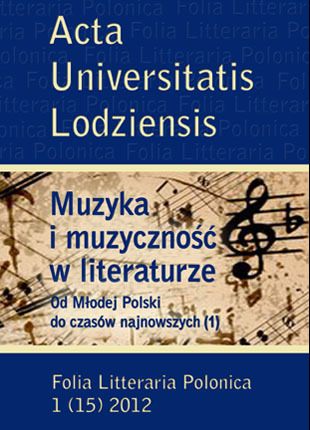Pieśni Mieczysława Karłowicza do słów Kazimierza Przerwy-Tetmajera w świetle poglądów XIX-wiecznych teoretyków muzyki na muzyczność języka polskiego
DOI:
https://doi.org/10.18778/1505-9057.15.02Abstrakt
The first part of the article is devoted to the analysis of the 19th-century Polish music theory whose main focus was to study the relationship between text and music in vocal composition, especially from the perspective of the music features of the language and poetic works. Among analysed authors the central place is occupied by two discourses of Józef Elsner, and also the writings of Karol Kurpiński, Jan Jarmusiewicz, Franciszek Mirecki, Józef Sikorski and Władysław Wiślicki. Their goals are threefold: to define the musical characteristics of Polish language, to demonstrate the metrical possibilities of Polish poetry and to establish rules for proper linking text with music. The most im-portant criteria for the proper construction of the vocal work compiled on this basis are included in the second part of the article. They are then used to the analysis of 10 songs of Mieczysław Karłowicz (based on the poetry of Kazimierz Przerwa-Tetmajer). This allows to see some regularity, both in the application of the rules and derogations from them, proving the suitability of this research method and shedding new light on creative process of Karłowicz and Tetmajer.
Pobrania
Pobrania
Opublikowane
Jak cytować
Numer
Dział
Licencja

Utwór dostępny jest na licencji Creative Commons Uznanie autorstwa – Użycie niekomercyjne – Bez utworów zależnych 4.0 Międzynarodowe.











